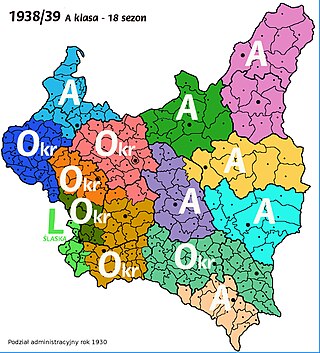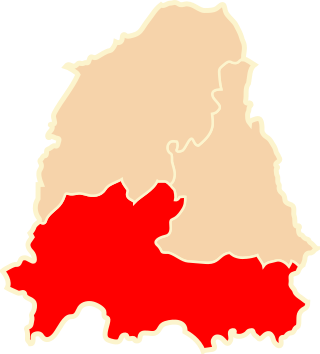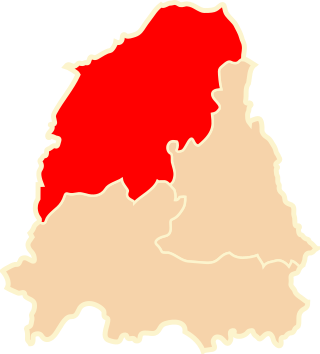
Volhynia or Volynia is a historic region in Central and Eastern Europe, between southeastern Poland, southwestern Belarus, and northwestern Ukraine. The borders of the region are not clearly defined, but in Ukraine it is roughly equivalent to Volyn and Rivne Oblasts; the territory that still carries the name is Volyn Oblast.

Volhynian Voivodeship was a unit of administrative division and local government in the Grand Duchy of Lithuania from 1566 until 1569 and of the Polish Crown within the Polish–Lithuanian Commonwealth from the 1569 Union of Lublin until the Third Partition of Poland in 1795. It was part of the Ruthenian lands in the Lesser Poland Province.

Kovel is a city in Volyn Oblast, northwestern Ukraine. It serves as the administrative center of Kovel Raion within the oblast. Population: 67,575.

27th Volhynian Infantry Division was a World War II Polish Home Army formed in the Volhynia region in 1944. It was created on January 15, 1944, from smaller partisan self-defence units during the Volhynia massacre and was patterned after the prewar Polish 27th Infantry Division.

The West Ukrainian People's Republic was a short-lived polity that controlled most of Eastern Galicia from November 1918 to July 1919. It included major cities of Lviv, Ternopil, Kolomyia, Drohobych, Boryslav, Stanyslaviv and right-bank Peremyshl. Apart from lands of Eastern Galicia, it also claimed the northern part of Bukovyna and the Carpathian Ruthenia. Politically, the Ukrainian National Democratic Party dominated the legislative assembly, guided by varying degrees of Greek Catholic, liberal and socialist ideology. Other parties represented included the Ukrainian Radical Party and the Christian Social Party.

Operation Tempest was a series of uprisings conducted during World War II against occupying German forces by the Polish Home Army, the dominant force in the Polish resistance.

Wołyń Voivodeship or Wołyń Province was an administrative region of interwar Poland (1918–1939) with an area of 35,754 km², 22 cities, and provincial capital in Łuck.

Volhynia Governorate, also known as Volyn Governorate, was an administrative-territorial unit (guberniya) of the Southwestern Krai of the Russian Empire. It consisted of an area of 71,736 square kilometres (27,697 sq mi) and a population of 2,989,482 inhabitants. The governorate bordered Grodno and Minsk Governorates to the north, Kiev Governorate to the east, Podolia Governorate to the south, Lublin and Siedlce Governorates, and after 1912, Kholm Governorate and Austria to the west. Its capital was in Novograd-Volynsky until 1804, and then Zhitomir. It corresponded to most of modern-day Volyn, Rivne and Zhytomyr Oblasts of Ukraine and some parts of Brest and Gomel Regions of Belarus.

The Ukrainian People's Republic (UPR) was a short-lived state in Eastern Europe. Prior to its proclamation, the Central Council of Ukraine was elected in March 1917 as a result of the February Revolution, and in June, it declared Ukrainian autonomy within Russia. Its autonomy was later recognized by the Russian Provisional Government. Following the October Revolution, the Central Council of Ukraine denounced the Bolshevik seizure of power and proclaimed the Ukrainian People's Republic with a territory including the area of approximately eight Russian imperial governorates. It formally declared its independence from Russia on 22 January 1918.

Budy Ossowskie massacre was a mass murder of ethnic Poles carried out on 29–30 August 1943 by a death squad of the Ukrainian Insurgent Army aided by the Ukrainian peasants during the Massacres of Poles in Volhynia and Eastern Galicia. About 290 people were killed, including women and children, all of them, Polish inhabitants of the Budy Ossowskie village, located in the Kowel County of the Wołyń Voivodeship in the Second Polish Republic. Budy Ossowskie village does not exist anymore. It was burned to the ground by the OUN-UPA. The charred remnants of the village were cleared in Soviet Ukraine for grazing cattle. Overall, in the Kowel County some 7,300 ethnic Poles were murdered.

Civil Administration of the Eastern Lands was a civil authority of the territories controlled by Second Polish Republic but not incorporated into the state itself, that was formed during the Polish–Soviet War in 1919 and existed until 1920. It was formed on 19 February 1919 from the territories taken by Poland during the war, that were previously occupied by the Russian SFSR. In the summer of 1920, forces of Russian SFSR had conquered the area. After part of the area was reconquered by Poland, the administration was formally disestablished on 9 September 1920, and replaced by the Provisional Administration of Front-line and Phase Territories.

Wołyń District League was a regional association football championship in the Wołyń Voivodeship, Poland in 1930–1939.

Civil Administration of the Lands of Volhynia and Podolian Front, also known as Commissariat of the Lands of Volhynia and Podolian Front was a civil authority of the territories controlled by Second Polish Republic but not incorporated into the state itself, that was formed during the Polish–Soviet War in 1920. It was formed on 17 January 1920 from the Civil Administration of the Eastern Lands and included Volhynian District and the surrounding area. In the summer of 1920, forces of Russian SFSR had conquered the area. After part of the area was reconquered by Poland, the administration was formally disestablished on 9 September 1920, and replaced by the Provisional Administration of Front-line and Phase Territories.
Chief of district was a public official in Second Polish Republic with the power to govern the districts. He was a representative of the Council of Ministers, responsible for the implementation of the laws as well as superior to local administration offices.

Volhynian District was a district of Second Polish Republic from 1920 to 1921. Its capital was Lutsk. It was formed on 20 December 1920 from Volhynian District of the freshly disestablished Provisional Administration of Front-line and Phase Territories. On 19 February 1921 it was reformed into Volhynian Voivodeship.

Volhynian District was a district of the Civil Administration of the Eastern Lands from September 1919 to January 1920, Civil Administration of the Lands of Volhynia and Podolian Front from January 1920 to September 1920 and Provisional Administration of Front-line and Phase Territories from September 1920 to December 1920, all of which were under the control of the Second Polish Republic. Its seat was located in Lutsk, and before that, its provisional seat was in Kovel.

Podolian District was a district of the Civil Administration of the Lands of Volhynia and Podolian Front that was under the control of Second Polish Republic. It existed from 17 January 1920 until summer 1920 when it was conquered by the Ukrainian SSR during the Polish–Soviet War. Its seat was located in Kamianets-Podilskyi.

Brześć District was a district of the Civil Administration of the Eastern Lands from June 1919 to September 1920, and Provisional Administration of Front-line and Phase Territories from September 1920 to December 1920, all of which were under the control of the Second Polish Republic. Its seat was located in Brest-Litovsk. In December 1919, it had an area of 57,758 km2 (22,300 sq mi), and was inhabited by 1,121,978 people.

Mińsk District was a district of the Civil Administration of the Eastern Lands from September 1919 to September 1920, and Provisional Administration of Front-line and Phase Territories from September 1920 to December 1920, all of which were under the control of the Second Polish Republic. Its seat was located in Minsk. In December 1919, it had an area of 35,947 km2 (13,879 sq mi), and was inhabited by 1 091 138 people.

Wilno District was a district of the Civil Administration of the Eastern Lands from June 1919 to September 1920, and Provisional Administration of Front-line and Phase Territories from September 1920 to December 1920, all of which were under the control of the Second Polish Republic. Its seat was located in Vilnius. In December 1919, it had an area of 48,466 km2 (18,713 sq mi), and was inhabited by 1,633,504 people.


















